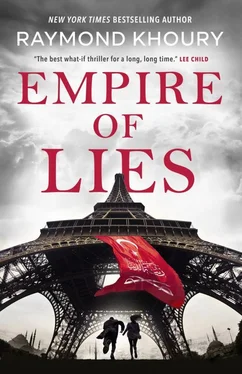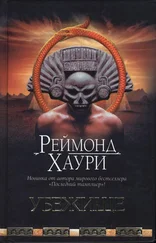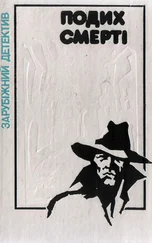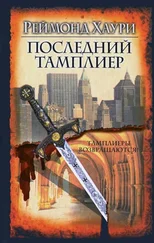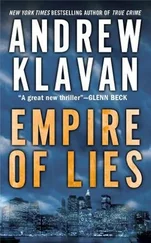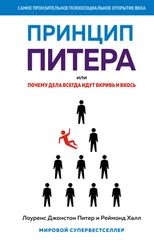Реймонд Хаури - Empire of Lies
Здесь есть возможность читать онлайн «Реймонд Хаури - Empire of Lies» весь текст электронной книги совершенно бесплатно (целиком полную версию без сокращений). В некоторых случаях можно слушать аудио, скачать через торрент в формате fb2 и присутствует краткое содержание. Город: New York, Год выпуска: 2019, ISBN: 2019, Издательство: Forge Books, Жанр: Альтернативная история, Триллер, на английском языке. Описание произведения, (предисловие) а так же отзывы посетителей доступны на портале библиотеки ЛибКат.
- Название:Empire of Lies
- Автор:
- Издательство:Forge Books
- Жанр:
- Год:2019
- Город:New York
- ISBN:978-1-250-21096-8
- Рейтинг книги:3 / 5. Голосов: 1
-
Избранное:Добавить в избранное
- Отзывы:
-
Ваша оценка:
- 60
- 1
- 2
- 3
- 4
- 5
Empire of Lies: краткое содержание, описание и аннотация
Предлагаем к чтению аннотацию, описание, краткое содержание или предисловие (зависит от того, что написал сам автор книги «Empire of Lies»). Если вы не нашли необходимую информацию о книге — напишите в комментариях, мы постараемся отыскать её.
Empire of Lies — читать онлайн бесплатно полную книгу (весь текст) целиком
Ниже представлен текст книги, разбитый по страницам. Система сохранения места последней прочитанной страницы, позволяет с удобством читать онлайн бесплатно книгу «Empire of Lies», без необходимости каждый раз заново искать на чём Вы остановились. Поставьте закладку, и сможете в любой момент перейти на страницу, на которой закончили чтение.
Интервал:
Закладка:
The man Kamal had come all this way to see.
The easier part was done.
The battle that followed would decide the fate of the world.
74
The day that again changed history began as unremarkably as any other.
The sun broke cover and overwhelmed the darkness, spreading its munificent light across the land, while life, it all its manifestations, unfurled itself from protective sleep and ventured out to seek sustenance.
On that particular day, however, something else was taking place. In this pastoral corner of the world, on either side of the glorious foothills of the Wienerwald, two massive legions of men, armed and trained for maximal bloodletting, were marching into battle.
And as had happened before, in a stolen history none of the battle’s participants were aware of, the army of Christendom prevailed once again.
Sobieski had listened.
And acted.
Charles, the Duke of Lorraine, was instrumental in convincing the king to believe the visitors. The emperor had put Charles, his brother-in-law, in command of the imperial army before the siege had begun. The duke was Viennese and knew Starhemberg well, and Kolschitzky’s detailed report about the count’s heroic efforts and the desperate situation inside the besieged city was too convincing to ignore. But what probably clinched it was that Sobieski was able to listen to Kamal’s arguments firsthand, without the need for an interpreter: before becoming king, Sobieski had spent years in Istanbul as a diplomatic envoy to the sultan’s court. He had learned to speak the language there, and Kamal’s commitment and his thorough knowledge of Kara Mustafa’s plans for the next day were, like Kolschitzky’s grim update, too compelling to brush off.
The commanders quickly drew up their new battle plans.
The ceremonial review was shelved. Instead, the army was roused from sleep and marched off at speed toward the high road that climbed the Vienna Woods.
The suicide bombers never made it to the ceremonial review that never happened. Instead, they were ambushed by Habsburg marksmen, who were utterly perplexed by the enormous firebomb their musket balls triggered.
The Ottoman army that was to follow the bombing never made it to the empty encampment in the plains of Tulln. It was taken by complete surprise on the slopes outside Vienna, with the Ottoman camp still in sight in the plain behind it. Sobieski had also used his time as an envoy in Istanbul to study Ottoman military traditions, and it was a body of knowledge he would now put to good use.
His army—the mounted hussars and dragoons charging ahead of the infantry—seized the ridges and spread out across the hilltops of the Vienna Woods several hours before the Ottoman troops had planned to reach them. The advance wasn’t easy, with steep slopes and narrow passages of loose ground to contend with. Bringing the light artillery was left until last, so as not to delay the movement of the troops. The cavalry found the climb hardest. In many places, the hussars had to dismount and lead their heavy horses up the pockmarked landscape on foot. Still, the pope’s men had pressed on, committed to their sacred mission.
And then they attacked.
On the hills that overlooked Vienna, in full view of the Ottoman encampment and the walls of the besieged city, the Polish musketeers and their allies rained fire on the advancing Ottomans, taking them by surprise before the cavalry—almost ten thousand horsemen—stormed down and cut them to pieces.
Kara Mustafa’s men, by now drained and demoralized by the months of siege, just ran.
The Polish hussars, who led the charges, were a terrifying sight: fierce warriors whose deadly reputation preceded them, they wore burnished steel armor, carried overlong lances, and rode massive horses. They also had tall wooden frames of eagle and ostrich wings strapped to their backs that gave off an eerie whistle as they galloped into battle. Surging as one in long, tightly packed lines, with wheeled field guns spewing fire from above, they looked like avenging angels of death as they impaled the fleeing Ottoman troops on the tips of their lances or cut them down with the long, triangular swords strapped to their wrists.
There was slaughter everywhere: on the high road that snaked up the mountain, on the pathways that veered off from it, in the forest, on the scrubland approaches to the foothills, and in the vineyards farther down the slopes that led back to the camp. Wave after wave of Christian fighters swept down from the high ground, a rampaging army of liberation delivering death under a white flag emblazoned with a scarlet red cross.
The retreating Ottomans found their progress stymied by the steep slopes, the rocky terrain, and the fields of densely entangled grapevines. The camp itself didn’t have any defenses set up facing the attackers coming from the Vienna Woods. All of its fortifications faced the other way, directed at the city walls. There was no shelter behind which to regroup, and those that did reach the camp didn’t stop there: they just kept running, abandoning everything and hitting the road to Buda, mostly on foot, with only a lucky few on horseback.
Kara Mustafa also fled. After hastily grabbing his treasure chest and the green Standard of the Prophet, the holy banner that the sultan had presented him at the outset of his campaign, he barely managed to escape on horseback with a few of his bodyguards.
The encampment was now ripe for the taking.
The massacre didn’t take long.
In a few hours, the entire camp was reduced to a mass graveyard. For miles around, the ground was littered with corpses and soaked with blood. In between the killing, the liberators also freed the thirty thousand men, women, and children that the Ottomans had rounded up from towns and villages close to Vienna. Kara Mustafa had ordered them killed before he’d fled the camp, but his men hadn’t had enough time to carry out his orders.
The relief army’s victory was complete, with Sobieski and his allies having suffered an astoundingly low number of casualties.
Vienna was saved.
But it was much more than that.
The Ottoman Empire had suffered a devastating defeat, the worst in its illustrious history. It was a defeat that would trigger a series of wars that would last a century and usher in the beginning of its long decline. The reconquest of territory seized by Islam over hundreds of years would now begin, with the victors’ minds awash with heady dreams of even liberating Constantinople itself.
Kamal and Kolschitzky weren’t far from Sobieski when he led his victorious troops through Vienna’s Scottish Gate.
Everyone turned out to greet him. To a rousing clamor of trumpets and kettledrums, Starhemberg and the rest of the city’s officials welcomed him with resounding cheers while a huge crowd of grateful survivors showered their savior with cries of gratitude and rushed up to kiss his hands and feet.
Leading one of the grand vizier’s prized horses and trailing the captured Ottoman banners, the Polish king acknowledged the crowd’s screams of “Long live the king” with gracious waves before proclaiming, “Venimus, vidimus, deus vicit” (“We came, we saw, God conquered”).
It was evident, though, that the city’s scars would take a long time to heal. So many had died. Almost every building had been disfigured by the war. Disease was still rampant, so much so that its tentacles would soon ensnare the liberators.
But before the rebuilding, the townspeople and the refugees could console themselves with the great pillaging that was to be had, for the Ottoman ghost city was a trove of riches. Tens of thousands of tents had been left behind, along with a sea of horses and over a hundred thousand heads of cattle that included Anatolian buffalo, camels, cattle, sheep, and goats. There was more artillery, gunpowder, and ammunition than they’d ever seen, with muskets and gold-mounted sabers aplenty and endless stockpiles of grain.
Читать дальшеИнтервал:
Закладка:
Похожие книги на «Empire of Lies»
Представляем Вашему вниманию похожие книги на «Empire of Lies» списком для выбора. Мы отобрали схожую по названию и смыслу литературу в надежде предоставить читателям больше вариантов отыскать новые, интересные, ещё непрочитанные произведения.
Обсуждение, отзывы о книге «Empire of Lies» и просто собственные мнения читателей. Оставьте ваши комментарии, напишите, что Вы думаете о произведении, его смысле или главных героях. Укажите что конкретно понравилось, а что нет, и почему Вы так считаете.
